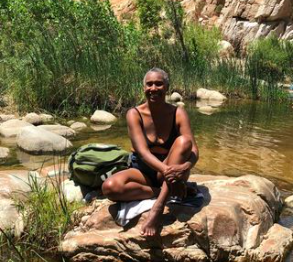Moon Cycles and Our Mysteries
Mawu by Linda Blacker
One of the most widespread fallacies is that Black people don’t like nature. Working with young people throughout the pandemic has proven to me that most of what Black youth are thinking about is being outside. Running the streets of a concrete jungle hardly qualifies as time in nature for the white elite, who have funds to support camping trips and natural vacations year round. The reality is that Black people have always had a different relationship with nature and the land, which is not only evident in our history but also in the way we engage nature on a daily basis. As Indigenous beings, ancient Black communities had rituals to honor the land, the seasons and all of the bountiful gifts Mother Earth and The Cosmos provide us with. In our experience of the transatlantic slave trade, Black people were forced to work foreign land that they honored with equal levels of respect, despite the circumstances of their captivity. To this day, there is little to no recognition of Black ownership over lands worked and nurtured for hundreds of years.
The relationship Black people have with nature is intrinsic. The return to Black spirituality and ancient religious traditions emphasizes the reality that Black people honor and engage nature regularly in every activity. This reality strikes me as we fight to preserve lands that we’ve honored as our home from gentrification and as we begin to collectively understand the role of environmental racism in our lives. The white community is perceived as more adjacent to the natural world but white culture is at the root of the destruction of our lands; Mother Nature herself can’t escape manifest destiny. Despite the reality that she will end everything before she becomes a captive, as the pandemic has proven. Unlike our white counterparts, who seek to conquer every liberated essence in The Universe, Black people are in a mutually beneficial symbiotic relationship with nature and claiming that relationship more and more everyday.
As we celebrate a new year on the Gregorian calendar, I am reminded of the truth of this measurement of time. So many of our ancestral societies lived based on moon cycles and calendars that aligned with the moon. The moon was seen as our cosmic mother and darkness understood as the womb from which all life sprung forth. Our bodies are mostly water, an element impacted in incredible ways by the moon. The moon was also revered because for a very long time there was an understanding that daylight existed separately from sunlight. As a result, the moon was seen as an honorable and loving deity who provided light in moments of deep darkness, while the sun brightened an already light sky. This belief is still reflected in so many mythologies, even the Christian bible, where God said “Let there be light!” before there was mention of a sun at all. There is evidence in ancient writings that the move towards veneration of the sun was intended to stifle the power women experienced in connection with the moon and goddesses of the moon. In other words, patriarchy showed up and ruined the party. Regardless, millions of our ancestors continued venerating the moon privately in an attempt to protect themselves from religious persecution.
Black people are making our way back to living in alignment with the moon. Thanks to the internet, so many Black women have been able to provide support for those who were removed from our culture and are interested in returning to ourselves. One such individual is Monique Ruffin (Moon Mama), who hails from Compton, one of Black Los Angeles’ holy lands. She offers an array of moon alignment courses, videos and astrological services fully intended to support Black beings in reclaiming our sovereignty. Monique’s daily moon videos include information about the day of the week and it’s associated planetary energies, as well as the way the moon supports in our transformation throughout its various cycles. Her willingness to be vulnerable in a world where honesty is not valued has allowed me to understand the role of community in new ways. When we are aligned with the moon, we understand that every feeling, experience and understanding has a rightful place in our being. It has the power to remove the stigma that infiltrated Black communities around devaluing our cycles and intuitive awarenesses. We downplayed ourselves as a form of protection but in so many ways we are safe now. We no longer have to hide ourselves from one another, because there is great strength and wisdom in the alignment of experiences. If we so desire and choose, we have one another and our mother, the moon, who supports us as we navigate our return to ourselves.
Some Sources



